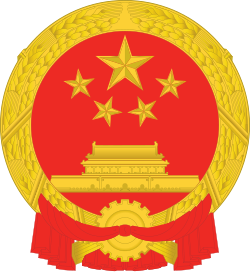 | |
| Formation | 1 October 1949 |
|---|---|
| Extinction | 27 September 1954 |
| Founding document | Common Program of the Chinese People's Political Consultative Conference |
| Country | China |
| Chinese Communist Party (CCP) | |
| Leader | Chairman of the CCP |
| Legislative branch | |
| Legislature | Chinese People's Political Consultative Conference (CPPCC) |
| Chair | Chairman of the CPPCC |
| Executive branch | |
| Leader | Chairman of the Central People's Government |
| Main body | Central People's Government Council |
| Main organ | Government Administration Council |
| Judicial branch | |
| Court | Supreme People's Court |
| Procuratorate | Supreme People's Procuratorate |
| Central People's Government of the People's Republic of China | |||||||||
|---|---|---|---|---|---|---|---|---|---|
| Traditional Chinese | 中華人民共和國中央人民政府 | ||||||||
| Simplified Chinese | 中华人民共和国中央人民政府 | ||||||||
| |||||||||
The Central People's Government was the central government of the People's Republic of China between 1 October 1949 and 20 September 1954. The government was formed in accordance with the Common Program and the Government Organic Law promulgated by the 1st National Committee of the Chinese People's Political Consultative Conference (CPPCC). [1]
Contents
The Central People's Government served as the provisional government for exercising state power before the 1st National People's Congress (NPC) was elected to draft the new constitution of China. The government ceased to exist after the enactment of the Constitution of the People's Republic of China on 20 September 1954,and was reformed into the constitutional government of China.
Since 1954,the "Central People's Government" has been synonymous with the "State Council" in the current government of China.[ citation needed ]
